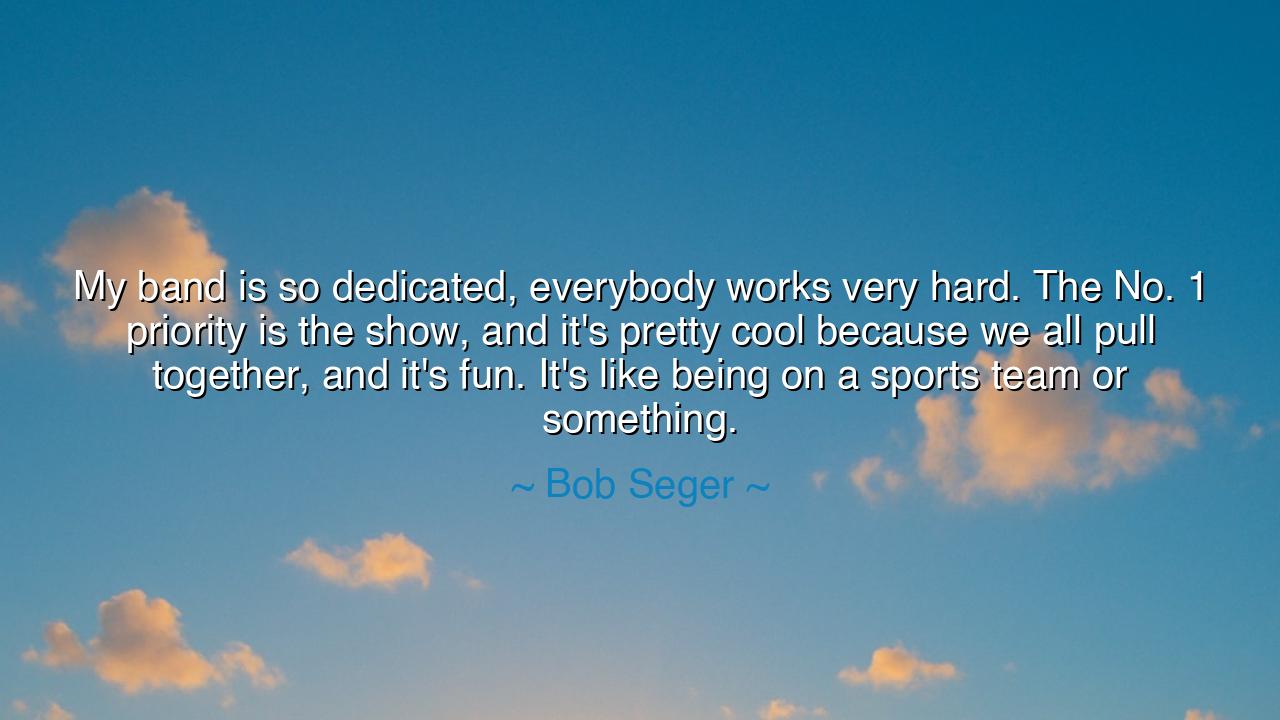
My band is so dedicated, everybody works very hard. The No. 1
My band is so dedicated, everybody works very hard. The No. 1 priority is the show, and it's pretty cool because we all pull together, and it's fun. It's like being on a sports team or something.






In the world of performance, where the energy of the crowd meets the dedication of the artist, there is an ancient truth that binds them— the power of teamwork. Bob Seger, a man whose music has resonated across generations, captures this truth when he says, "My band is so dedicated, everybody works very hard. The No. 1 priority is the show, and it's pretty cool because we all pull together, and it's fun. It's like being on a sports team or something." These words reveal not just a philosophy about music, but a deeper principle of collective effort and shared purpose. Seger’s statement speaks to the unity of spirit and action, where individual contributions blend into a greater whole, where the focus is not just on the individual but on the success of the collective.
In the ancient world, teamwork was revered as a cornerstone of both battle and civilization. The great warriors of ancient Greece, such as those who fought at Thermopylae, knew that victory was not achieved through individual prowess alone, but through the unity and dedication of the entire group. King Leonidas, leading the 300 Spartans, did not rely on the strength of any one man but on the unyielding spirit of the whole group. Their unity, their shared dedication to a common cause, made them legendary. Similarly, Seger’s words echo this ancient wisdom: in music, as in battle, success is born of cooperation, discipline, and shared sacrifice.
Seger’s view of his band as a sports team highlights a fundamental truth about both performance and life—the greatest achievements are the result of collective effort. In ancient Rome, the gladiatorial games were a brutal test of individual skill, but it was often in the training and discipline of the gladiators as a unit that their success was ensured. They were not simply competitors; they were brothers-in-arms, each relying on the others for support and survival. Seger’s band, like the gladiators, thrives on their unity, their combined dedication to the performance, the shared goal of putting on the best show possible. In both cases, it is not just the individual’s talent, but the cooperation of the whole group that defines their success.
The analogy to a sports team that Seger draws is particularly powerful, for in the arena of competition, the finest victories are those earned through teamwork, discipline, and mutual respect. The ancient Olympic Games were a celebration of individual achievement, but they were also a symbol of the broader societal ideals—competition and cooperation in the service of excellence. The athletes of ancient Greece, from runners to wrestlers, were celebrated not just for their personal victories but for their role in bringing honor to their city-state. Their achievements were seen as a reflection of the collective strength of their people. In the same way, Seger’s commitment to the band as a team mirrors this ancient ethos, where every note played, every rhythm followed, is a testament to the group’s dedication and focus.
Seger’s acknowledgment of the band's dedication reflects the emotional and psychological power of shared purpose. The Stoics of ancient Greece, who valued virtue and personal discipline, understood that the collective strength of a community was built upon the individual contributions of each person. In the same way, the success of Seger’s band is not only a reflection of each musician’s talent but also of the spirit of collaboration, the joy that comes from working toward a common goal. When the band pulls together as one, when the individual is subordinated to the collective, something powerful emerges. This is true not just in music, but in every endeavor, from war to art, where success depends on the unity of effort.
The lesson in Seger’s words, then, is one of unity and shared purpose. In our own lives, we are often called upon to work not just as individuals, but as members of a greater whole. Whether it is in the pursuit of a career, the building of a community, or the crafting of something meaningful, the collective effort is what brings true success. The lesson of teamwork—of discipline, mutual respect, and shared sacrifice—is as ancient as civilization itself, and it remains as relevant today as it was in the time of the Spartans, the Olympians, or the gladiators.
So, let us take this wisdom into our own lives. In every endeavor, let us remember that true greatness is not achieved in isolation, but in the shared efforts of those around us. Like Seger’s band, we must find joy in the collective purpose, the dedication to the task, and the unity that binds us to one another. When we work together, when we support one another, we elevate not only ourselves but the greater whole, forging paths of success, achievement, and fulfillment. The strength of teamwork is a timeless virtue, one that has carried warriors, philosophers, and musicians alike to greatness. And it is through our shared efforts that we, too, will find our greatest triumphs.






AAdministratorAdministrator
Welcome, honored guests. Please leave a comment, we will respond soon